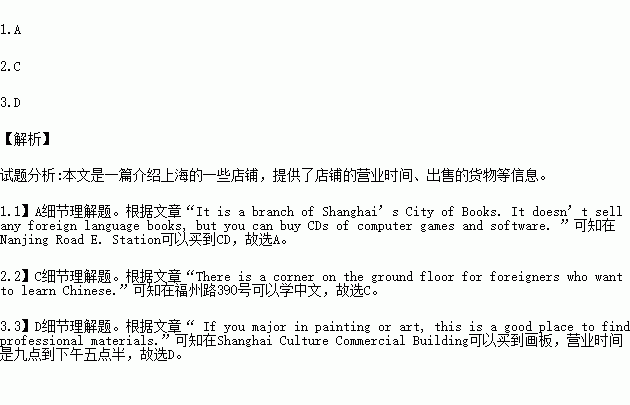题目内容
Fuzhou Road is famous for its book stores.
Shanghai’s City of Books (Nandong)
Address: No. 345, Nanjing Road. E. near Shandong Road N.
Tel: 6322-1557
Opening Hour: 9:30—21:30
It is a branch of Shanghai’s City of Books. It doesn’t sell any foreign language books, but you can buy CDs of computer games and software.
Traffic: Metro Line No. 2 (Nanjing Road E. Station)
Shanghai’s City of Books
Address: No. 465, Fuzhou Road
Tel: 6391-4848
Opening Hour: 9:30—20:30
This is the biggest book store in Shanghai with six floors. Each floor has different kinds of books, but most English books are for Chinese students preparing for exams.
Foreign Language Bookstore
Address: No. 390, Fuzhou Road
Tel: 6322-3200
Opening Hour: 9:00—18:00
You can find many English novels on the ground floor, as well as dictionaries. There is a corner on the ground floor for foreigners who want to learn Chinese.
On the higher floors, you can find some professional books in English. Of course, many of the books are for Chinese students.
Shanghai Culture Commercial Building
Address: No. 355, Fuzhou Road
Opening Hour: 9:00—17:30
This store has a variety of stationery (文具) and painting materials. If you major in painting or art, this is a good place to find professional materials.
1.If you want to buy CDs of computer games, you can get off at ______.
A. Nanjing Road E. Station B. Shandong Road N. Station
C. Fuzhou Road E. Station D. Nanjing Road N. Station
2.If your foreign friends want to learn Chinese, you can suggest they go to ______.
A. No. 345, Nanjing Road. B. No. 465, Fuzhou Road
C. No. 390, Fuzhou Road D. No. 355, Fuzhou Road
3.From the introduction of the four book shops, Li Hua can buy a drawing-board as a birthday gift for her sister between ______.
A. 9:30 and 21:30 B. 9:30 and 20:30
C. 9:00 and 18:00 D. 9:00 and 17:30
 阅读快车系列答案
阅读快车系列答案
